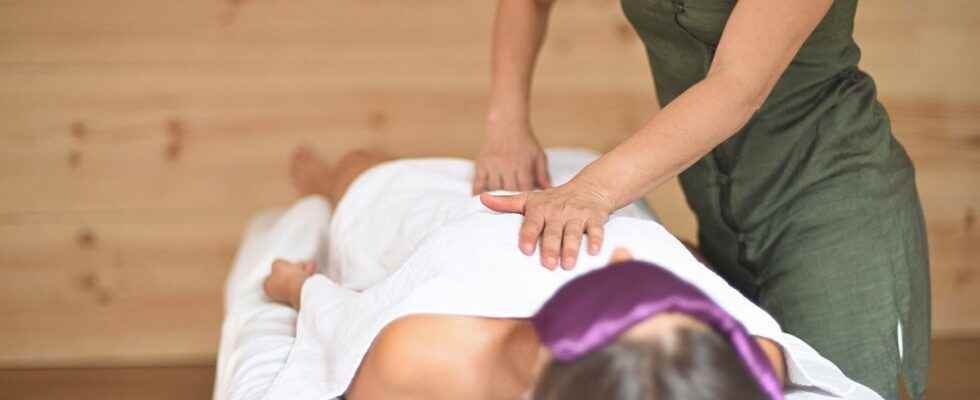Published on
Updated
Reading 4 mins.
Have you ever felt uncomfortable about entering a beauty salon? A strange concept if we consider that they are above all synonymous with relaxation and well-being, but very real for those who do not fit into the boxes. A problem taken head-on by a handful of entrepreneurs, determined to smash the injunctions and make well-being accessible to all.
Going to a beauty salon to enjoy a massage, a facial, or a massage, is undoubtedly a harmless gesture, and even one of the most pleasant, for most people. But it can be particularly complicated for those who suffer from a health problem, have a form of disability, have skin problems, or simply do not meet these famous standards of beauty which, if they have been undermined for several years, have a hard life.
Traditional beauty institutes do not a priori close the door to those who do not fit into the boxes, but the look at this or that particularity can transform a well-being parenthesis into an embarrassing moment. And if this is not the case, it is clear that the care offered does not always meet everyone’s needs. While the fashion and beauty sectors are currently changing, multiplying commitments to become more inclusive, institutes seem to be lagging behind in this area. Something that new actors are trying to overcome with establishments designed and open to people who do not meet the standards imposed by society.
Inclusive places to listen
Inclusiveness isn’t just about weight, body type, sex, or gender. Skin color, culture, origin, disease, age, and disability are also among the particularities that lead to the banishment of the people concerned. And in the beauty sector, it can even concern a woman who chooses not to wax anymore, or an individual whose body bears scars. So many examples that prevent some people from enjoying a moment of relaxation, but which pushed a couple, Laurent and Sophie, to open the doors of a new kind of beauty and well-being institute: Dulcenae .
Nestled in the heart of Paris, in the 9th arrondissement, this establishment is open to everyone, whatever their needs, particularities or desires. A first in the world of professional care. And it is also beauticians with degrees in socio-aesthetics who welcome, listen, and take care of men and women to meet the needs of all bodies and all skin types. Designed as an apartment, the institute is distinguished by a card that is both classic, because there are treatments, massages, and hair removal sessions as there are in many establishments, and personalized because each of these treatments are provided according to individual needs. Physical disability, cancer, unique skin, masculine beauty… Everything has been thought out to make well-being accessible to as many people as possible.
“Here, the treatments take note of the singularity of the body, undertake to take into account individual concerns, moods as much as skin conditions. Nothing is preconceived. Treatment protocols are imagined with and around the client. No gesture is repeated from one person to another. To each client, his story“, can we read as a preamble on the website of Dulcenae.
For his part, it is to fight against the exclusion of the LGBTI community that Yann founded Maison Bergamote, an institute located in the 18th arrondissement of Paris. On the same principle, it is a question of making beauty and well-being accessible to all. In “a space of [son] apartmentt”, as he himself states on the institute’s presentation page, Yann also pays particular attention to the needs, desires, and bodies of all his clients, whoever they are, to through massages and treatments, as well as discovery workshops.
“I propose a space as free as possible from the systems of oppression that are exacerbated in the environment of self-care. I make every effort to fight within the Maison Bergamote against sexism, lesbophobia, homophobia, transphobia, fatphobia, racism, validism, classism and lookism“, he says on the establishment website. Rare fact, the professional practices the free rate “in order to offer the possibility of taking care of oneself to the greatest number”.
Beauty combined with the masculine
Now determined to free themselves from the codes of masculinity, men have also long been excluded from beauty salons. This is not to say that they were not accepted there, but that their presence was not as harmless as it should have been, or that the care was not necessarily adapted to their own needs. Makeup, hairdressing, massages, waxing, body and face care, slimming, tanning, and so on, beauty salons are gradually opening up to men, while establishments entirely dedicated to these gentlemen are springing up everywhere. in France. A way to change again the famous social norms which could until then put off some people at the idea of taking advantage of such a well-being parenthesis.
BG Factory, Comptoir de l’Homme, Cercle Delacre, or Institut Booster are among the many establishments now reserved for men, some of which, it should be noted, opened their doors many years ago. An ever-increasing offer, much more than the one mentioned above, which is gradually pushing traditional institutes to also open up to male beauty. And if there is still progress to be made in this area, it is clear that these actors and activists are helping to open the way to a much more inclusive beauty.
